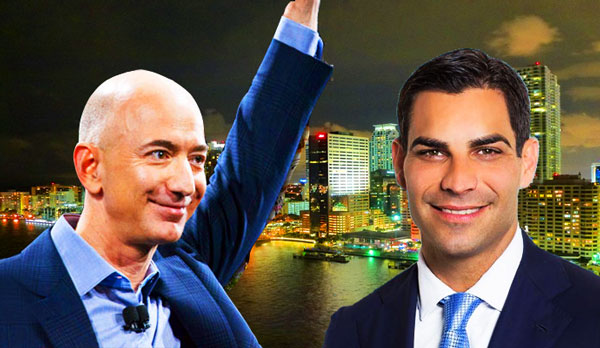Jeff Bezos and Miami Mayor Francis Suarez (Credit: Pixabay, David Ryder/Getty Images, Wikimedia Commons)
UPDATED, 4:20 p.m., Jan. 22: Who stands to gain if Miami wins Amazon’s second headquarters?
Of five sites in Miami-Dade submitted in a regional bid, three are in or near Overtown, Miami Mayor Francis Suarez told The Real Deal. Real estate investor Mitchell Newman owns one site; Michael Simkins owns the other – the Miami Innovation District property in Park West; and the third is the mixed-use Miami Worldcenter project site, Suarez said. Property records show Newman owns land just south of I-395 in Overtown.
Despite the challenges facing Miami – the increasing threat of sea level rise and a limited public transportation system – it made Amazon’s list of 20 cities it’s considering for the company’s $5 billion second headquarters.
Miami-Dade, Broward and Palm Beach counties had submitted a joint bid for the project, targeting eight potential sites in South Florida. In addition to five in Miami-Dade, there are two in Broward and one in Palm Beach, according to published reports.
Simkins and his partners spent $100 million assembling a 10.4-acre fiefdom in Park West, which includes a nightclub called E11even, the Club Space nightclub and several warehouses and vacant parcels. “We already had the DNA for large office plates” within the Miami Innovation District site with floor plates as large as 200,000 square feet, Simkins said.
While the sites were submitted as two, “it makes sense” to combine his property with Miami Worldcenter for Amazon’s second headquarters, Simkins added. The developer wouldn’t provide a timeline for the innovation district, but said he’s in talks with office tenants, co-living operators and other potential tenants.
A spokesperson for Miami Worldcenter could not immediately be reached for comment.
“What many people who aren’t living in [the city of] Miami don’t understand is that it’s 90 percent underbuilt in terms of our zoning capacity, believe it or not, so we have a ton of growth available,” Suarez said.
City leaders pitched Overtown as a potential site in the fall, citing its proximity to the airport and to Greater Downtown Miami, and undeveloped land.
Brightline is also poised to improve transportation between downtown Miami, Fort Lauderdale and West Palm Beach when the first phase is operational later this year. A Tri-Rail station connecting to Brightline is in the works, as well.
Miami-Dade’s proposal also included Codina Partners’ Downtown Doral.
In addition to the submitted options, other potential sites could be at Mana Wynwood or the Magic City Innovation District in Miami’s Little Haiti neighborhood, Suarez suggested “[Amazon] is going to come and survey the city and make their decision,” he said.
Amazon released its shortlist of proposals on Thursday, with New York, Los Angeles, Chicago, Boston and others making the cut. There were 238 proposals from around the U.S., Canada, and Mexico for HQ2. Amazon founder and CEO Jeff Bezos also spent some time living in South Florida. He graduated from Miami Palmetto High School in 1982.
“Some people were surprised we made the list. We’ve grown in the tech sector, financial sector, arts and culture. When I first moved here the cultural offerings were slim pickings,” said Miami Downtown Development Authority Executive Director Alyce Robertson. “This is showing that our business climate has matured to a level that we’re an international business capital as well as a place that is very livable.”
The e-commerce giant eventually expects to grow the second headquarters to the size of its Seattle HQ. It’s looking for an area with low cost of living, an educated workforce, high incentives, at least 1 million people, and access to an international airport.
Included in the South Florida bid is, obviously, the region’s quality of life. “Even though we’re experiencing cold weather here in Miami, it’s 50 degrees and not zero degrees,” Robertson said.
A diverse and multilingual talent pool, research universities and primary schools, international airports and its proximity to Latin America and the Caribbean are among the other benefits Miami has to offer, she said
Critics argue that the growing threat of sea level rise, an increasing number of super storms and flooding will keep Amazon from selecting Miami. Robertson and other proponents disagree.
“It’s somewhat of a sensational risk. We just passed a $400 million bond issue to deal with resiliency. There’s this image we’ll be like Atlantis,” she said. “There are parts of Miami-Dade that are on higher ground,” and for the parts that aren’t, local municipalities are implementing resilient building codes, raising roads and more.
“Yes we have hurricanes. But we’ve had hurricanes for a long time. We have the strongest building codes,” she added. “We have our challenges, but managing the water is one of the things we’re working on.”

